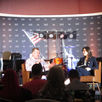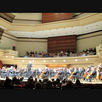DuPage Symphony Orchestra presents Striving for Justice
- Jan 25, 2022
- 4 min read
Updated: Apr 12, 2023
The concert program called Striving for Justice will take place at 7:30 p.m. on Saturday, February 5 at Wentz Concert Hall in Naperville.

Photo: DuPage Symphony Orchestra. Courtesy of DuPage Symphony Orchestra
“Exclusion is never the way forward on our shared paths to freedom and justice,” said South African bishop and human rights activist Desmond Tutu. The DuPage Symphony Orchestra supports freedom and justice and is happy to present its new concert program that is based on masterpieces that demonstrate this message through the means of music. It’s called Striving for Justice and will be presented only in one concert that will take place at 7:30p.m. on Saturday, February 5 at Wentz Concert Hall located at 171 E Chicago Avenue in Naperville.
The DuPage Symphony Orchestra was founded in 1954 with forty-five volunteer musicians. Russell Harvey, co-founder of the orchestra, led as Music Director for 31 years. Maestra Barbara Schubert joined in 1986, and since then she has been successfully performing the roles of Music Director and Conductor for this wonderful organization. Her enthusiasm, dynamic leadership, and devotion to music inspire not only the musicians, whose number has already grown to more than 100, but also the audience members, who demonstrate their love for classical music by attending as many DuPage Symphony Orchestra concerts as they can.
Music Director Barbara Schubert was honored by the Illinois Council of Orchestras as the 2003 Conductor of the Year. In 2013, the DuPage Symphony Orchestra was named Community Orchestra of the Year by the Illinois Council of Orchestras.
I have been writing about this orchestra for a few years already, and I can say that each program presented by this musical organization is always created with a deep thought and with an interesting main idea and is organized in a professional and creative manner. Each piece corresponds with another one and complements it, and eventually the audience can see the full picture of what the music director was trying to deliver to the audience.
This concert program demonstrates this approach as well. It starts with Leonore Overture No 2 written by German composer Ludwig van Beethoven. “One of four overtures written for Ludwig van Beethoven’s only opera Fidelio, the Leonore Overture No. 2 mirrors the intensity of the opera itself, in which a faithful wife disguises herself as a guard to rescue her husband from torture and death in a political prison,” says the DuPage Symphony Orchestra’s website. This particular overture was performed at the premiere of the opera in 1805.
The libretto, written by French playwright and librettist Jean-Nicolas Bouilly, is a story of heroism, personal sacrifice and eventual triumph, and all that is reflected in Beethoven’s music. Slow and thoughtful introduction eventually develops into a beautiful and optimistic theme. Later on, the offstage trumpet calls remind of the part of the opera where the arrival of the king’s representative, who brings justice to the imprisoned hero, is announced.
It will be followed by Leonard Bernstein’s Symphonic Suite from Elia Kazan’s highly acclaimed 1954 film called On the Waterfront. This film is about a union man who tries to stand up to the corrupt mob bosses leading the Longshoremen’s Union. Through the means of music, the composer demonstrates the fight against injustice, extortion, corruption, and violence. Bernstein uses disjunct melodies, wide intervals, dissonance and jazz-style syncopated rhythms. Interestingly, he was dissatisfied with the use of his score in the film, and therefore the composer re-crafted the material into a powerful concert suite, which will be presented by the DuPage Symphony Orchestra to its audience.
The second half of the program will feature Symphony No. 1 in E minor by American composer Florence Price. Price was herself familiar with societal inequity. She studied music from her childhood and later attended the New England Conservatory of Music, one of the few institutions at the time to admit African Americans. In her compositions, Price combined norms and principles of classical music with the sounds of spirituals and African rhythms and dances. The year of 1933 became an important year in her life as she became the first black female composer to have her work performed by a major orchestra. She won a composing competition and had her Symphony No. 1 in E Minor played by the Chicago Symphony Orchestra.
However, Price’s road to justice and equal rights was not always easy. As she wrote in a 1943 letter to Serge Koussevitzky, Music Director of the Boston Symphony, “To begin with, I have two handicaps, that of sex and race. I am a woman and I have negro blood in my veins.” Koussevitzky never programmed her music. After her death, Price’s works were partially forgotten, but now her compositions are being rediscovered and performed by many orchestras around the United States. The DuPage Symphony Orchestra is one of them.
“Injustice anywhere is a threat to justice everywhere,” said Martin Luther King, Jr. It’s true today too, and it’s in our power to make sure that justice is always served. Some people deliver this message through the spoken word, but musicians have their own way to serve justice - through music.
Single tickets are on sale now. Tickets start at only $38 and great seats are still available. Purchase your tickets from the North Central box office or by calling 630-637-SHOW. Gift certificates are also available. Purchase one at the Striving For Justice concert or by calling the DSO office at (630) 778-1003.
Natalia Dagenhart
1/24/2022

























Comments